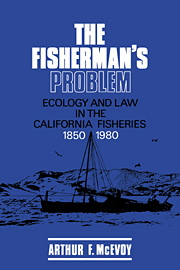Book contents
- Frontmatter
- Contents
- List of figures
- List of tables
- Preface
- Acknowledgments
- List of abbreviations
- Introduction
- I The miner's canary
- II Sun, wind, and sail, 1850–1910
- III The industrial frontier, 1910–1950
- IV Enclosure of the ocean, 1950–1980
- 8 Gridlock
- 9 Something of a vacuum
- 10 Leaving fish in the ocean
- Conclusion
- Appendixes
- Notes
- Selected bibliography
- Index
10 - Leaving fish in the ocean
Published online by Cambridge University Press: 06 January 2010
- Frontmatter
- Contents
- List of figures
- List of tables
- Preface
- Acknowledgments
- List of abbreviations
- Introduction
- I The miner's canary
- II Sun, wind, and sail, 1850–1910
- III The industrial frontier, 1910–1950
- IV Enclosure of the ocean, 1950–1980
- 8 Gridlock
- 9 Something of a vacuum
- 10 Leaving fish in the ocean
- Conclusion
- Appendixes
- Notes
- Selected bibliography
- Index
Summary
The conclusion which arises from these ecological considerations is that benefit to the nation occurs by leaving fish in the ocean.
– NOAA, Anchovy Management Plan (1978)The modern environmental movement came of age during the early 1970s. As had been the case with its Progressive-Era counterpart, the new movement sprung from deep roots in social and economic changes that had been decades in the making. Rising standards of living since World War II had led many more people than before to value outdoor recreation in “natural” settings. Antibiotics and other changes in medical technology had all but conquered infectious disease and left in its place environmental pollution and what came to be known as “lifestyle” disorders as the chief threats to public health. An era of cheap and abundant energy came to an abrupt end with the sudden rise in oil prices in 1973–4 and the simultaneous public awareness that nuclear power was a far more dangerous and expensive alternative than had originally been thought.
Like its predecessor, the “new” conservation movement owed its remarkable power to the way in which contemporary environmental issues symbolized a broad range of social problems. Rachel Carson's Silent Spring, for example, demonstrated that chemical pollution was not an isolated problem but symptomatic of a systemic one, the result not of a technical but of a much more serious social maladjustment: the logical outgrowth of the society's historically imperial, manipulative approach to nature.
- Type
- Chapter
- Information
- The Fisherman's ProblemEcology and Law in the California Fisheries, 1850–1980, pp. 227 - 248Publisher: Cambridge University PressPrint publication year: 1986



